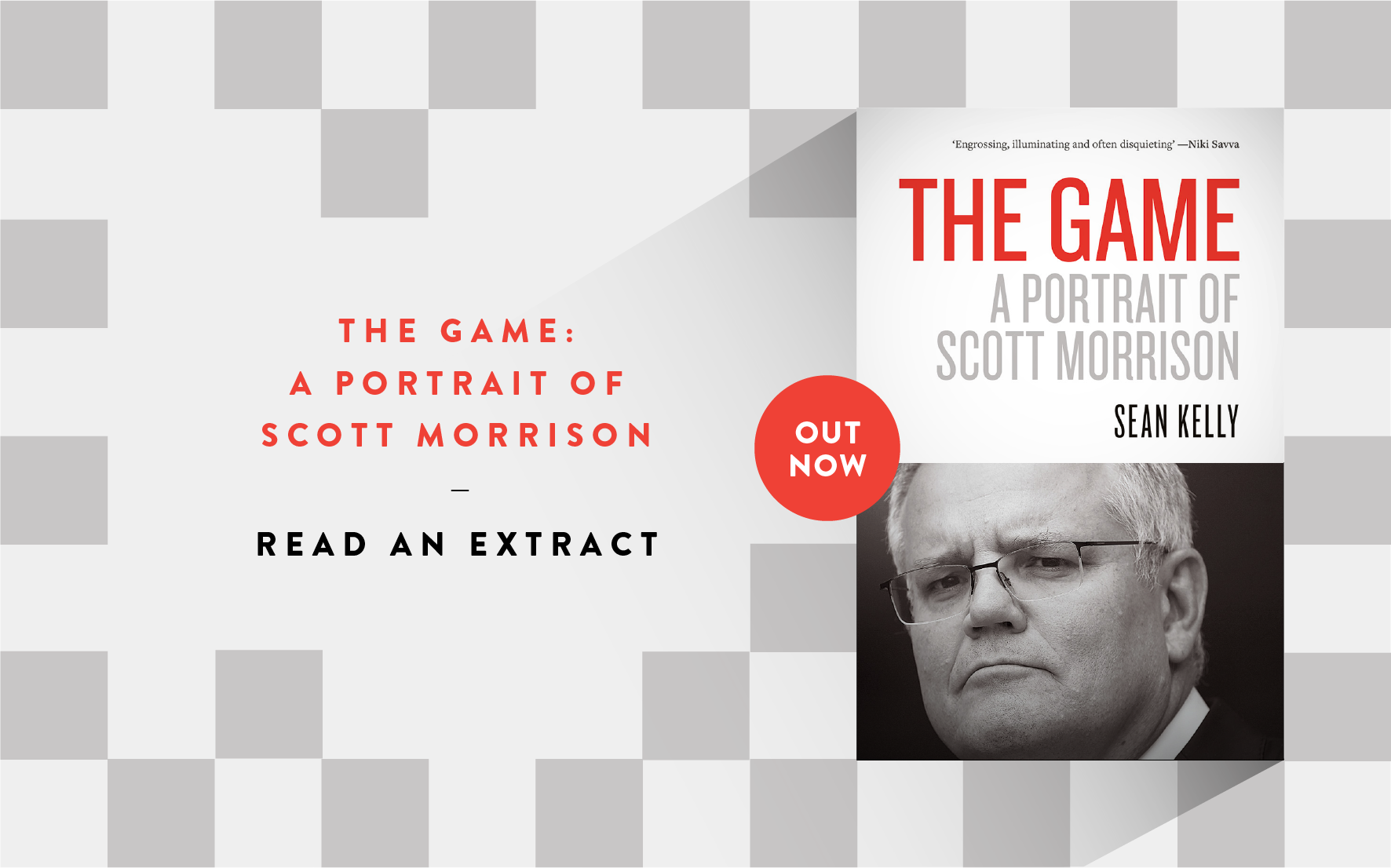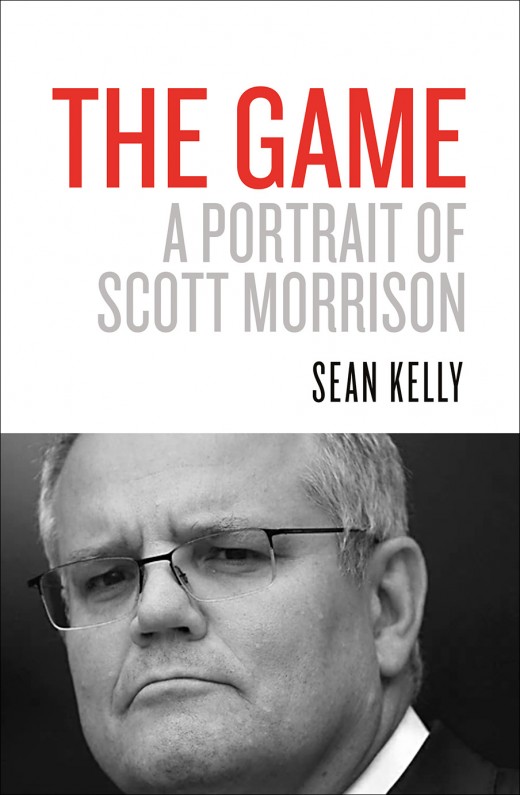News

News >
Read an extract: The Game
What happens when the prime minister views politics as a game? The Game, is a must-read account of a man, a time and a nation. Read an edited extract.
The journalist Katharine Murphy has recounted a story about Morrison when he was treasurer, told to her by independent senator Nick Xenophon:
Lower house MPs had filed into the Senate chamber for the governor-general’s speech, and were in the process of filing out when the milling throng brought Xenophon and Morrison together. Xenophon at the time was an influential player in the Senate, a vote the government needed periodically. ‘I said to [Morrison] it would be good to catch up for a coffee, because I actually enjoyed talking to him about policy,’ Xenophon recalls. ‘He looked at me askance and said, “What for?” I said just to catch up and have a chat about issues. He said, “No, mate. I’m purely transactional.”’ Xenophon laughs at the memory, but he wasn’t laughing at the time. ‘It was pretty blunt. It was a pretty terse response, basically fobbing me off. I thought, okay. I felt a bit chastised. I thought this isn’t someone you want to shoot the breeze with. “I’m purely transactional.” I was taken aback. I thought I had worked pretty constructively with him, even on the asylum seeker issue.’
In this fascinating anecdote, full of Xenophon’s injured pride, Morrison appears, on first reading, scrupulously honest. This honesty comes at the cost of the ordinary social niceties most of us take for granted. Xenophon’s shock suggests that their earlier interactions – when Morrison had needed him – had given him a very different impression, that the pleasant manner Morrison had displayed might last beyond that specific moment. Most of us, once we have been nice to someone, feel the pull of obligation, the need to be nice to them again, to carry on in the same vein lest the earlier interaction be rendered obviously false in retrospect. Having been, perhaps, insincerely nice, for reasons of convenience or need, we feel we have accrued a debt; that debt can only be paid (perversely enough) by continuing the insincerity. In other words, we act, in each moment, as though it is just one of many moments stretching out before and behind us, and which are connected to each other. Xenophon’s tale suggests that for Morrison, each moment stands alone. For him, an interaction demands only what it demands: he will do what needs to be done at that precise point in time. He never feels, in himself, insincere or untruthful, because he always means exactly what he says; it is just that he means it only in the moment he is saying it. Past and future disappear.
This suggests a tantalising possibility. When Morrison sent that queasily pleasant text message to Malcolm Turnbull, right after he had taken the prime ministership, Turnbull likely believed it to be genuine. Later, he came to see it as the insincere act of a hypocrite – certainly, when he included it in his book, that is how he intended us to read it. It is possible, though, that Morrison believed what he said entirely – that whatever had happened in the days before was, in some sense, unavailable to him. When he sent that message, the past no longer existed.
This may explain why it is so difficult to understand Morrison beyond the most basic facts. Most of us make sense of the world through story, which depends on chronology and causation: this happened, and this made that happen, and that caused this other thing to happen. This is how language works as well. Each sentence tells a story – subject, verb, object – something did something to something else.
For Morrison, there is no story; events are not joined. His perception of the world is like that ad for Australia he once helped create: a series of crisp images, each separate from the next. This is the way he speaks, which is very possibly the way he thinks.
And this is how Morrison comes across, isn’t it? We see a series of images of the man, never the man himself or a story that might help make sense of him. He is kicking a football; he is cooking a curry; he is wearing an orange hi-vis vest; he is stopping the boats; he is overseeing a regime in which children suffer; he is hugging his family.
Perhaps this makes sense of the trophy, too.
Morrison told Jane Cadzow, ‘What you have to do in this portfolio is just be very comfortable in your own skin about the decisions you’re taking and why you are taking them. And I am.’ To Annabel Crabb, he said, ‘The thing none of us like about politics is many of the things you’ve raised today, about what does such-and-such think about this – I’ve just learnt not to care. And I really don’t that much.’
Both Cadzow and Crabb, who had spent some time with Morrison, redescribed this attitude in their own words. Each used expressions involving sleep and the idea that Morrison slept well. Cadzow wrote that he had ‘the clear eyes and smooth visage of one who sleeps soundly at night’. After hosting him on Kitchen Cabinet, Crabb said, ‘He really didn’t seem to care at all. I think that is why he is a really powerful figure in the Coalition; he does the awful work that makes people yell at you in the street, and he doesn’t lie awake worrying about people hating him.’
When somebody has a guilty conscience, we say that they have troubled dreams. In Shakespeare’s greatest tale of guilt, Macbeth, having murdered, loses the ability to sleep – he keeps hearing, instead, an insistent voice: ‘Macbeth has murdered sleep, and therefore Macbeth will sleep no more.’ He says this to Lady Macbeth, immediately after he has told her something else: that he cannot pray either.
Why can Macbeth neither sleep nor pray? Shakespeare gives the answer: ‘My dull brain was wrought / With things forgotten.’ It is not that Macbeth is a moral man – he has killed for ambition. Rather, as critic James Wood writes, it is that Macbeth has an active memory, one that will not leave him alone.
In an interview with Katharine Murphy, Morrison told her he had a terrible memory. Instead, he said, ‘I have a flow brain.’
This is one of those awful phrases kidnapped from psychology and imported into business schools. In short, it means to be utterly sunk in your work, so immersed that time begins to fly. In a TED Talk about the flow state, Mihaly Csikszentmihalyi, the psychologist who coined the term, explained what it was like: the task just goes by automatically, he said. ‘You don’t think.’
I cannot say whether Morrison feels the moral burdens of refugee policy strongly or weakly, deeply or only at a shallow level. I wonder, though, whether these metaphors are a way to search in the wrong place: perhaps he feels things both deeply and strongly, but only very quickly, before they are gone again, replaced by the next thing, and the next. In all this, he is the opposite of Macbeth: he sleeps well, has no trouble praying and is not troubled by his conscience – and the reason is that he remembers nothing at all.
The Game: A Portrait of Scott Morrison by Sean Kelly is out now.
Share this post
About the author
Sean Kelly is a columnist for the Nine papers and a regular contributor to The Monthly. He was a political adviser to Kevin Rudd and Julia Gillard.
More about Sean Kelly




